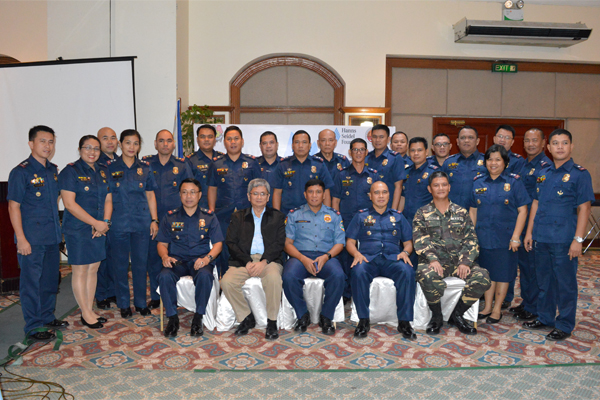PNP holds Rights-Based Policing Forum with Civil Society Organizations and Training of Police Human Rights Officers in Mindanao

HSF
The event was held on September 8, 2016 in Davao City and designed to provide police officers and the citizens a common understanding of the police procedures, how these relate to the officers’ practicing rights-based policing, and how the PNP officers and CSOs can work together locally to promote the respect for human rights. The forum gave local police and CSO representatives the opportunity to network with, and discuss common issues affecting local peace and order.
The PNP-HRAO arranged for an officer from the Police Regional Office to provide a general briefing on police operational procedures (POPs) with emphasis on those which, if not followed, result to the most number of complaints, such as patrol procedures, checkpoints, and serving warrants of arrest.
During the open forum, CSO representatives asked questions and were provided guidance and clarification as these relate to police operational procedures, and security protocols in place after the country was put on a “state of national emergency” as a result of a bomb explosion at a night market in Davao City just about a week ago which killed at least 14 and injured more than 60 persons. The explosion was determined to have been caused by an improvised explosive device commonly used by local terrorists and criminal gangs, and the government has not yet ruled out the possibility that drug traffickers, religious extremists, or kidnap-for-ransom groups might be responsible for the incident.

HSF
Among those who also responded to questions were Chief Superintendent Carlos De Sagun of the PNP Directorate for Police Civil Relations, Chief Superintendent Dennis Siervo of the PNP-HRAO, and city and municipal chiefs of police in Davao City and the Province of Davao del Sur. Davao City Councilor Atty. Antoinette Principe who heads the City Council’s Committee on Civil, Political and Human Rights represented the city mayor. CSO representatives came from the Mindanao Peace-Building Institute, Mindanao Coalition of Development NGOs, among others. Other government representatives came from the National Commission on Muslim Filipinos and the National Commission on Indigenous Peoples. Participants lauded the PNP for conducting such a forum and asked that these be conducted in other areas throughout the country.
Prior to the PNP-CSO Forum, the PNP-HRAO conducted a two-day training on Rights-Based Policing for over 25 police region-, province-, and city-based human rights officers from Mindanao for them to enhance their knowledge on rights-based policing and incorporate these in mission planning, conduct of training and operational activities, and at all times being sensitive to the economic, socio-cultural and political issues in the local areas of responsibility. The training is premised on the need to continuously provide training opportunities to help ensure individual growth, and on a collective note, the teams’ over-all or unit-level capability enhancement.

HSF
Aside from a review of HRBP concepts and application, the training focused on: incorporation of HRBP principles in local police operations including civil disturbance management, and responding to the media; conduct of further training for other PNP human rights officers with emphasis on adherence to laws and police operational procedures; and use of verbal, non-verbal and e-based communication and networking skills. This training activity was designed to enhance the knowledge and have a deeper understanding on the practical, policing-specific applications of Human Rights and incorporate these as a required mindset in regular (mission) strategy, planning, conduct of training and other operational activities and at all times being sensitive to the economic, socio-cultural and political issues in the local areas of responsibility.
HSF’s partnership with the PNP supports human rights-based policing training for PNP human rights officers and trainers, and the holding of fora for representatives of the PNP and CSOs to introduce the PNP's "Rights-Based Policing Program," which promotes the police officers' competence, professionalism and networking with the community. HSF has been working successfully with the PNP since 2008 for the implementation of the PNP human rights development program and provided technical and funding assistance in the conduct of human rights training, deepening seminars and the publication/production of training and information materials, among others. In 2013, HSF renewed its partnership with the Philippine Public Safety College (PPSC) to strengthen police training through the extensive use of practical, case-based training. Core faculty and police instructors from the PPSC’s constitutive agencies are given further training to develop case material and effectively share these with their colleagues in the field for the latter to integrate in their respective training curricula and programs of instruction.
